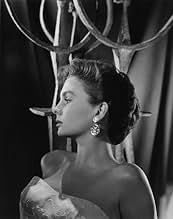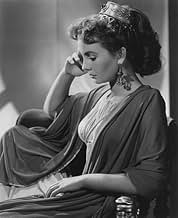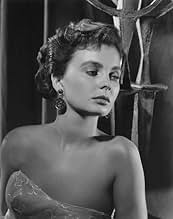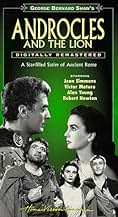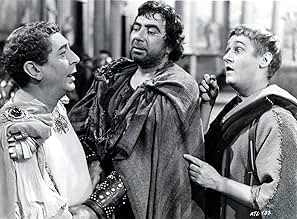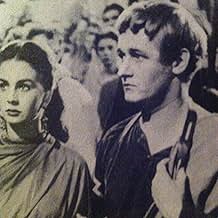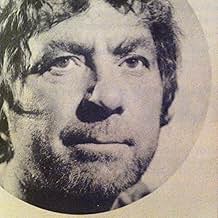AVALIAÇÃO DA IMDb
6,0/10
1,1 mil
SUA AVALIAÇÃO
Adicionar um enredo no seu idiomaStory of a Christian in ancient Rome who befriends a lion.Story of a Christian in ancient Rome who befriends a lion.Story of a Christian in ancient Rome who befriends a lion.
- Direção
- Roteiristas
- Artistas
Abdullah Abbas
- Gladiator
- (não creditado)
Doris Barton
- Vestal Virgin
- (não creditado)
Mary Bayless
- Christian
- (não creditado)
Chet Brandenburg
- Christian
- (não creditado)
Carol Brooks
- Vestal Virgin
- (não creditado)
- Direção
- Roteiristas
- Elenco e equipe completos
- Produção, bilheteria e muito mais no IMDbPro
Avaliações em destaque
After his gargantuan Technicolor folly 'Caesar and Cleopatra' nearly bankrupted Lord Rank, producer Gabriel Pascal ended his film career with a whimper at RKO with a final, much cheaper Shavian adaptation in black & white.
It's not really any more stagy than the earlier epic, and provides the satisfaction of seeing a radiant Jean Simmons promoted from a bit player in the former film to the female lead. Elsa Lanchester is a scream as the hero's nagging wife, Robert Newton as Ferrovious, described as having "the strength of an elephant and the temper of an angry bull" is fearsome even when turning the other cheek. And it's not every day you see Jim Backus playing a centurion.
It's not really any more stagy than the earlier epic, and provides the satisfaction of seeing a radiant Jean Simmons promoted from a bit player in the former film to the female lead. Elsa Lanchester is a scream as the hero's nagging wife, Robert Newton as Ferrovious, described as having "the strength of an elephant and the temper of an angry bull" is fearsome even when turning the other cheek. And it's not every day you see Jim Backus playing a centurion.
George Bernard Shaw was hesitant about allowing his plays to be turned into movies. He was impressed with motion pictures, and frequently allowed himself to be in short subjects where he could reveal his current social theories. Shaw was probably the first major literary figure to leave several reels of film interviews. But he was aware of the liberties taken with literary properties turned into movies - particularly plays. Shakespeare had not fared too well in the movies up to the 1930s. Most filmed plays seemed cut up - the screenwriters, producers, and directors being concerned with time factors. Shaw did not trust his works in their hands.
Shaw found an above-average producer in Gabriel Pascal. Pascal loved Shaw's works and he went to see him. He admitted that he had little money but showed his devotion to Shaw's ideas. Shaw gave him a contract to produce all his plays. From 1938 to 1950 Pascal only produced three films but they were PYGMALION with Leslie Howard and Wendy Hiller, MAJOR BARBARA with Hiller, Robert Morley, Rex Harrison, and Robert Newton, and CAESAR AND CLEOPATRA with Vivian Leigh, Claude Rains, Steward Granger, and Flora Robson. They all remain memorable movies to this day. Although Shaw did complain of some deletions he was well served by these films.
In 1950 Shaw died, but his contract with Pascal was to last until Pascal died. However, Pascal only produced one last film, ANDROCLES AND THE LION. Produced by RKO it was the shortest of the Pascal movies, most likely due to the production standards and controls of RKO boss Howard Hughes. The casting was quite unique, in that the roles were played by pretty well known actors: Newton again, Alan Mowbray, Reginald Gardiner, Victor Mature, Jean Simmons, and Maurice Evans. Although Mature is stiff he gives a capable performance. Newton (not drunk here, like he was in BLACKBEARD) showed what a fine comic actor he could be. Witness the scene where he almost frightens Gardiner to death while explaining why he has become a changed man since he converted to Christianity. Maurice Evans, best recalled now as "Maurice" the father of Samantha on BEWITCHED, gave one of his three best lead parts (with his villain in KIND LADY and his Sir Arthur Sullivan in THE GREAT GILBERT AND SULLIVAN)as the philosophic Roman Emperor. Simmons lightens the film's love story with Mature. She always gave good performances. The interesting role in the film is the lead: Alan Young.
Young's career was taking off in 1952. He had started appearing on television in his own weekly variety/comedy program. He also was looking forward to other film roles. There would be another lead part in the now forgotten AARON SLICK FROM PUNKIN CREEK shortly afterward, and eventually nice supporting roles in TOM THUMB and (possibly his best performance) THE TIME MACHINE (1960). And then his role as Wilbur Post in MR. ED. Not a tremendous career but it got quite a bit of mileage in it, and it is still recalled fondly. He gives a nice performance as a soft-spoken, meek Androcles, who represents the truest spirit of Christianity of all the characters in the film (most of whom do not fully grasp the simplicity and quiet goodness at the heart of the faith). It does not hold center stage or attention in the movie (in fact it is forgotten while we concentrate on the antics of Newton's "muscular" Christianity or the Simmons/Mature romance or Evans' cat and mouse game with a courtier who happens to be a secret Christian, but also a political opportunist). But when Young turns up again, he does keep our attention in his scenes.
The result is an enjoyable film, but not of the standard of the three preceding ones. It would be the model (now that Shaw was dead, and soon after Pascal) of how the movies would treat Shaw's plays. The great dramatist was lucky that Pascal gave his all on those first three, for (except for the film of the musical version of PYGMALION - MY FAIR LADY) most of the remaining films of Shaw's plays (THE DOCTOR'S DELEMMA, THE DEVIL'S DISCIPLE, THE MILLIONAIRESS, GREAT CATHERINE) showed more of the cutting and rewriting - and usually inferior rewriting - that Shaw dreaded. Of the post-1952 films only THE DEVIL'S DISCIPLE and MY FAIR LADY hold up really well.
But there is one intriguing mystery about this film project. Pascal and Howard Hughes did come up with an odd casting of the lead role that was not seen to it's conclusion to the everlasting loss of motion pictures. Androcles was not originally cast for Alan Young, but for Harpo Marx. There were discussions with Harpo to play the role, and there may have been some actual footage shot for about a month, when Hughes decided it was not going to work out. Harpo was removed from the film, and Young got the role. Leaving a great hole in the story: what was the original film to be - was Harpo to perform his usual way (pantomime) or did he actually essay for the first time in his career to speak the lines. We don't know. While footage of lost movies occasionally turns up (such as Joseph Von Stenberg's I CLAUDIUS), most of these films that are jettisoned are destroyed. One hopes that Harpo's attempted performance was put on some film that has survived. It would be wonderful to see him in a talking role in a serious play by an English literary master. Harpo prided himself on his erudition and self-taught education He was a member of the Algonquin Circle with Kaufman and Hart, Alexander Woolcott, Edna Ferber, and Morris Ryskind. He should have made a fascinating figure as Androcles, but instead he was replaced. I safely feel it was our loss.
Shaw found an above-average producer in Gabriel Pascal. Pascal loved Shaw's works and he went to see him. He admitted that he had little money but showed his devotion to Shaw's ideas. Shaw gave him a contract to produce all his plays. From 1938 to 1950 Pascal only produced three films but they were PYGMALION with Leslie Howard and Wendy Hiller, MAJOR BARBARA with Hiller, Robert Morley, Rex Harrison, and Robert Newton, and CAESAR AND CLEOPATRA with Vivian Leigh, Claude Rains, Steward Granger, and Flora Robson. They all remain memorable movies to this day. Although Shaw did complain of some deletions he was well served by these films.
In 1950 Shaw died, but his contract with Pascal was to last until Pascal died. However, Pascal only produced one last film, ANDROCLES AND THE LION. Produced by RKO it was the shortest of the Pascal movies, most likely due to the production standards and controls of RKO boss Howard Hughes. The casting was quite unique, in that the roles were played by pretty well known actors: Newton again, Alan Mowbray, Reginald Gardiner, Victor Mature, Jean Simmons, and Maurice Evans. Although Mature is stiff he gives a capable performance. Newton (not drunk here, like he was in BLACKBEARD) showed what a fine comic actor he could be. Witness the scene where he almost frightens Gardiner to death while explaining why he has become a changed man since he converted to Christianity. Maurice Evans, best recalled now as "Maurice" the father of Samantha on BEWITCHED, gave one of his three best lead parts (with his villain in KIND LADY and his Sir Arthur Sullivan in THE GREAT GILBERT AND SULLIVAN)as the philosophic Roman Emperor. Simmons lightens the film's love story with Mature. She always gave good performances. The interesting role in the film is the lead: Alan Young.
Young's career was taking off in 1952. He had started appearing on television in his own weekly variety/comedy program. He also was looking forward to other film roles. There would be another lead part in the now forgotten AARON SLICK FROM PUNKIN CREEK shortly afterward, and eventually nice supporting roles in TOM THUMB and (possibly his best performance) THE TIME MACHINE (1960). And then his role as Wilbur Post in MR. ED. Not a tremendous career but it got quite a bit of mileage in it, and it is still recalled fondly. He gives a nice performance as a soft-spoken, meek Androcles, who represents the truest spirit of Christianity of all the characters in the film (most of whom do not fully grasp the simplicity and quiet goodness at the heart of the faith). It does not hold center stage or attention in the movie (in fact it is forgotten while we concentrate on the antics of Newton's "muscular" Christianity or the Simmons/Mature romance or Evans' cat and mouse game with a courtier who happens to be a secret Christian, but also a political opportunist). But when Young turns up again, he does keep our attention in his scenes.
The result is an enjoyable film, but not of the standard of the three preceding ones. It would be the model (now that Shaw was dead, and soon after Pascal) of how the movies would treat Shaw's plays. The great dramatist was lucky that Pascal gave his all on those first three, for (except for the film of the musical version of PYGMALION - MY FAIR LADY) most of the remaining films of Shaw's plays (THE DOCTOR'S DELEMMA, THE DEVIL'S DISCIPLE, THE MILLIONAIRESS, GREAT CATHERINE) showed more of the cutting and rewriting - and usually inferior rewriting - that Shaw dreaded. Of the post-1952 films only THE DEVIL'S DISCIPLE and MY FAIR LADY hold up really well.
But there is one intriguing mystery about this film project. Pascal and Howard Hughes did come up with an odd casting of the lead role that was not seen to it's conclusion to the everlasting loss of motion pictures. Androcles was not originally cast for Alan Young, but for Harpo Marx. There were discussions with Harpo to play the role, and there may have been some actual footage shot for about a month, when Hughes decided it was not going to work out. Harpo was removed from the film, and Young got the role. Leaving a great hole in the story: what was the original film to be - was Harpo to perform his usual way (pantomime) or did he actually essay for the first time in his career to speak the lines. We don't know. While footage of lost movies occasionally turns up (such as Joseph Von Stenberg's I CLAUDIUS), most of these films that are jettisoned are destroyed. One hopes that Harpo's attempted performance was put on some film that has survived. It would be wonderful to see him in a talking role in a serious play by an English literary master. Harpo prided himself on his erudition and self-taught education He was a member of the Algonquin Circle with Kaufman and Hart, Alexander Woolcott, Edna Ferber, and Morris Ryskind. He should have made a fascinating figure as Androcles, but instead he was replaced. I safely feel it was our loss.
In a lengthy letter to the editor in the October 1960 issue of "Films in Review," a very young Robert Osborne supplies some erudition on the casting of "Androcles and the Lion." According to the film historian, shooting began with Harpo Marx in the title role and continued under the direction of Chester Erskine for five weeks. Osborne states that the film's producer and Shaw impresario Gabriel Pascal thought him "the perfect Androcles," and maintains that the rushes were thought to be "brilliant." However, RKO studio boss Howard Hughes had recently seen Alan Young on a TV show, and impetuously insisted that the part be recast. That meant all the footage involving Harpo had to be reshot.
Unfortunately because of the delay two other principle cast members were lost to other commitments: Rex Harrison as Caeser and Dana Andrews as the Roman captain. Footage with them was scrapped and is presumed lost. They were replaced with Maurice Evans and Victor Mature. The two other stars, Robert Newton and Jean Simmons, making her American film debut, were able to stay.
Although IMDb trivia claims that Harpo was only considered for the role, Mr. Osborne's reputation, gravitas, and record of film scholarship gives this anecdote credibility. It certainly is typical of the idiosyncratic and fickle Hughes that he would have these kind of caprices. Just one year earlier after John Farrow had completed "His Kind of Woman," the unpredictable billionaire brought in Richard Fleischer to shoot some additional scenes. Incredibly Fleischer ended up reshooting virtually the entire film when Hughes suddenly decided he now wanted Raymond Burr as the villain and had a large expensive set built in the studio tank for a superfluous sight gag involving Vincent Price that lasted only a few seconds on screen.
Although it's unlikely that any of this footage will surface, if indeed it exists, but one can always hope.
P.S. Victor Mature had a refreshingly off-beat sense of humor, and unlike other egotistical stars of the period, never took himself too seriously. According to co-star Jim Backus, he and Mature decided to go to a local café for lunch rather than suffer through a meal at the RKO cafeteria. The waitress was surprised to see the two men in ancient Roman military uniforms and was shocked and amused to hear the actors ask for the usual "servicemen's discount."
Unfortunately because of the delay two other principle cast members were lost to other commitments: Rex Harrison as Caeser and Dana Andrews as the Roman captain. Footage with them was scrapped and is presumed lost. They were replaced with Maurice Evans and Victor Mature. The two other stars, Robert Newton and Jean Simmons, making her American film debut, were able to stay.
Although IMDb trivia claims that Harpo was only considered for the role, Mr. Osborne's reputation, gravitas, and record of film scholarship gives this anecdote credibility. It certainly is typical of the idiosyncratic and fickle Hughes that he would have these kind of caprices. Just one year earlier after John Farrow had completed "His Kind of Woman," the unpredictable billionaire brought in Richard Fleischer to shoot some additional scenes. Incredibly Fleischer ended up reshooting virtually the entire film when Hughes suddenly decided he now wanted Raymond Burr as the villain and had a large expensive set built in the studio tank for a superfluous sight gag involving Vincent Price that lasted only a few seconds on screen.
Although it's unlikely that any of this footage will surface, if indeed it exists, but one can always hope.
P.S. Victor Mature had a refreshingly off-beat sense of humor, and unlike other egotistical stars of the period, never took himself too seriously. According to co-star Jim Backus, he and Mature decided to go to a local café for lunch rather than suffer through a meal at the RKO cafeteria. The waitress was surprised to see the two men in ancient Roman military uniforms and was shocked and amused to hear the actors ask for the usual "servicemen's discount."
G.B.S. declared in the lengthly "Preface" to this play, written years after its 1913 premiere (the "Preface is actually longer than the play itself), that he had written it in pique at the one J.M. Barry play he had ever thoroughly disliked - PETER PAN! The sentiment certainly sets a bench mark for measuring what Shaw may have accomplished in his charming, witty examination of a "Greek wizard" Christian (Androcles) who finds animals of all stripes and species more lovable and easy to get along with than his long (and vocally) suffering wife and neighbors.
It also may explain why Hollywood missed with this neatly produced filming despite a number of inspired casting choices (Maurice Evans as Caesar, Elsa Lanchaster as Androcles' wife & Robert Newton as the warrior/Christian, Ferrovius) and deft directorial touches.
In trying to focus on the "family friendly" (deadly words in the Hollywood lexicon) aspects of Shaw's charming satire, the film gives a bad case of the "cutsies" to the central role (it would have been interesting to see this Alan Young performance before he became so identified with his role, Wilbur, in TV's iconic MR. ED) and soft pedals or ignores most of the legitimately humorous byplay among his fellow Christians who wish martyrdom to wildly varying degrees and the infighting of the professional gladiators who echo (in somewhat more bloodthirsty fashion) the outrageous practicality of Captain Bluntschli in Shaw's early ARMS AND THE MAN.
Having made the decision to play the lion *as* a lion (before or after Harpo Marx departed the production?), the delicious hold on adult satire Shaw infused his play with was probably a lost cause, but what remains remains a very pleasant diversion worth a Saturday afternoon. For lovers of good Shaw however, it's more than a little watered down - perhaps most surprising of all, more watered down that the later equally enjoyable musical version Richard Rodgers and Peter Stone did for TV with Noel Coward as Caesar and Norman Wisdom as Androcles!
It also may explain why Hollywood missed with this neatly produced filming despite a number of inspired casting choices (Maurice Evans as Caesar, Elsa Lanchaster as Androcles' wife & Robert Newton as the warrior/Christian, Ferrovius) and deft directorial touches.
In trying to focus on the "family friendly" (deadly words in the Hollywood lexicon) aspects of Shaw's charming satire, the film gives a bad case of the "cutsies" to the central role (it would have been interesting to see this Alan Young performance before he became so identified with his role, Wilbur, in TV's iconic MR. ED) and soft pedals or ignores most of the legitimately humorous byplay among his fellow Christians who wish martyrdom to wildly varying degrees and the infighting of the professional gladiators who echo (in somewhat more bloodthirsty fashion) the outrageous practicality of Captain Bluntschli in Shaw's early ARMS AND THE MAN.
Having made the decision to play the lion *as* a lion (before or after Harpo Marx departed the production?), the delicious hold on adult satire Shaw infused his play with was probably a lost cause, but what remains remains a very pleasant diversion worth a Saturday afternoon. For lovers of good Shaw however, it's more than a little watered down - perhaps most surprising of all, more watered down that the later equally enjoyable musical version Richard Rodgers and Peter Stone did for TV with Noel Coward as Caesar and Norman Wisdom as Androcles!
This is the flaming story of history's most fabulous era, a period of regal splendor, beautiful women, pursued Christians and spectacular combats on the circus arena during the glittering days of pagan Rome. Stage-bound Hollywood rendition based on George Bernard Shaw's great play about a taylor : Alan Young, in imperial Rome who saves Christians from a hungry lion who had formerly befriended.
This attractive film packs sharp dialogue, laughs supreme, entertainment and a lot of fun-midst scenes of sensational wonders into the Roman world . Including a sympathetic, intelligent and charming plot within the bounds of Hollywood. The film is pretty well, but it isn't an extraordinary yarn , but a simple and plain amusement, resulting to be a semi-satisfactory morsel. Harpo Marx was originally cas as Androcles but he was fired by the famous financer and producer Howard Hughes five weeks into the filming. Main and support cast are frankly good, such as : Alan Young as the likeable and silly Androcles , Jean Simmons as Christian damsel in distress , Maurice Evans as the proud emperor and Victor Mature as a Centurion, the latter also played other Colossal films as "The Robe" and "Demetrius and the Gladiators" . Along with an awesome support cast, such as : John Hoyt, Alan Mowbray, Elsa Lanchaster, Gene Lockhart, Noel Willman, Lowell Gilmore, Jim Backus, and several others.
It displays an atmospheric cinematography in black and white by cameraman Harry Stradling Sr, though mostly shot in studio . The motion picture was professionally written and directed by Chester Erskine and uncredited Nicolas Ray . Chester Erskine was a good craftsman, a prestigious writer who made a few movies, such as : "Irish whiskey rebellion" , "A change in the wind" , "A girl in every port", "The egg and I" , "Take one false step" , "A change in the wind" , "Frankie and Johnny" , among others. Rating : 6/10. Passable and acceptable. Well worth seeing.
This attractive film packs sharp dialogue, laughs supreme, entertainment and a lot of fun-midst scenes of sensational wonders into the Roman world . Including a sympathetic, intelligent and charming plot within the bounds of Hollywood. The film is pretty well, but it isn't an extraordinary yarn , but a simple and plain amusement, resulting to be a semi-satisfactory morsel. Harpo Marx was originally cas as Androcles but he was fired by the famous financer and producer Howard Hughes five weeks into the filming. Main and support cast are frankly good, such as : Alan Young as the likeable and silly Androcles , Jean Simmons as Christian damsel in distress , Maurice Evans as the proud emperor and Victor Mature as a Centurion, the latter also played other Colossal films as "The Robe" and "Demetrius and the Gladiators" . Along with an awesome support cast, such as : John Hoyt, Alan Mowbray, Elsa Lanchaster, Gene Lockhart, Noel Willman, Lowell Gilmore, Jim Backus, and several others.
It displays an atmospheric cinematography in black and white by cameraman Harry Stradling Sr, though mostly shot in studio . The motion picture was professionally written and directed by Chester Erskine and uncredited Nicolas Ray . Chester Erskine was a good craftsman, a prestigious writer who made a few movies, such as : "Irish whiskey rebellion" , "A change in the wind" , "A girl in every port", "The egg and I" , "Take one false step" , "A change in the wind" , "Frankie and Johnny" , among others. Rating : 6/10. Passable and acceptable. Well worth seeing.
Você sabia?
- CuriosidadesAfter principal filming was completed, Howard Hughes decided the film needed some extra sprucing up. He had Nicholas Ray shoot a "Vestal Virgin Bathing Sequence" which immediately ran afoul with censors and enraged producer Gabriel Pascal, amongst others. The sequence was eventually deleted from release prints.
- Erros de gravaçãoThe Christians sing "Onward, Christian Soldiers" - a hymn published in 1871.
- Cenas durante ou pós-créditosOpening credits prologue: ROME 161 A.D. IN THE REGION OF THE EMPEROR ANTONINUS
- ConexõesFeatured in It's Showtime (1976)
- Trilhas sonorasOnward, Christian Soldiers
(uncredited)
Music by Arthur Sullivan
Words by Sabine Baring-Gould
Sung by the marching Christians
Principais escolhas
Faça login para avaliar e ver a lista de recomendações personalizadas
- How long is Androcles and the Lion?Fornecido pela Alexa
Detalhes
Bilheteria
- Orçamento
- US$ 1.250.000 (estimativa)
- Tempo de duração1 hora 38 minutos
- Cor
- Proporção
- 1.37 : 1
Contribua para esta página
Sugerir uma alteração ou adicionar conteúdo ausente

Principal brecha
By what name was Androcles e o Leão (1952) officially released in India in English?
Responda
